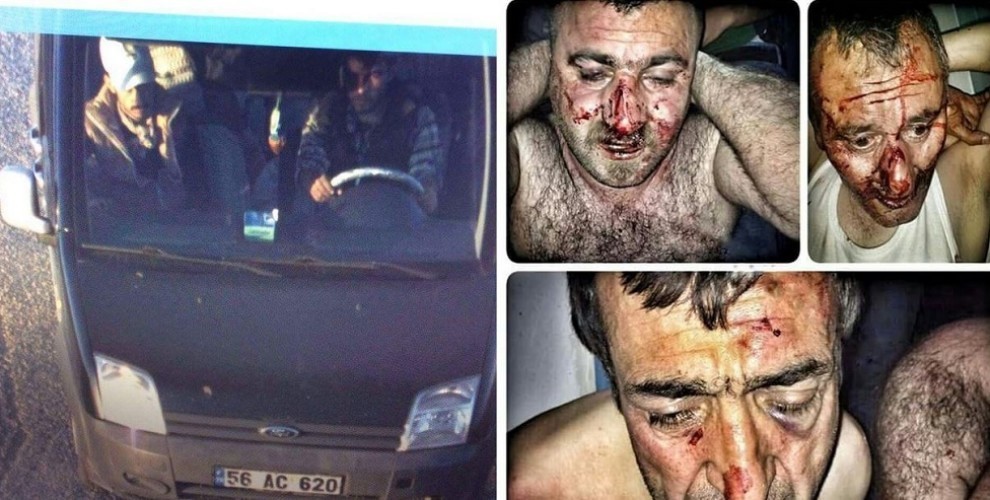Torture has become culture in Turkey
TİHV Diyarbakır Representative Barış Yavuz stated that torture has become culture in Turkey, and is instated by the state.
TİHV Diyarbakır Representative Barış Yavuz stated that torture has become culture in Turkey, and is instated by the state.

Torture has always been practiced to the extremes in Turkey, but the last two years have seen it practiced openly and as a legitimate method. Police and army torture during the curfews and after the coup attempt have been shared on social media to create an atmosphere of fear. Some recent most blatant examples have been villagers on their way to pick mushrooms in Gevaș being severely tortured, and having their photographs published in the media, after which they were proven to be not guilty, and the case of Osman Yalavuz, shot in his yard on June 19, and Mesut Yalavuz, taken to the operation grounds and attempted to be "disappeared".
Turkey Human Rights Foundation (TİHV) Diyarbakır Representative Barış Yavuz spoke to the ANF for June 26 Day Against Torture and Day of Solidarity with the Tortured and commented on the scope of the practice in the country.
"TORTURE HAS BECOME CULTURE IN TURKEY"
Yavuz said they received 121 appeals of torture in the first 5 months of the year. He stressed that there is a great increase from previous years and pointed out that nothing has actually changed in Turkey for years, and that the torture experienced today has been going on openly for years. Yavuz stated that torture has become culture in Turkey and added: "Now we see torture being blatantly practiced in this period. Torture is strictly forbidden. A person's right to freedom and security can be restricted, but torture is forbidden in any and all cases. There are no excuses and no exceptions. But this last year we have seen tortured persons being paraded on screens. With this, the current government is institutionalizing torture. They are internalizing torture and turning it into a viable option. But neither the international treaties nor the domestic laws in Turkey have changed. Torture is still strictly forbidden. At this point in time, they are instating a perception that it is sometimes possible to use torture."
Yavuz said a new clause was added to the law stating that an inquiry on the police and the army can only be launched with permission from the Prime Ministry during the "curfews", and that this is a "shield of impunity" in practice: "This means a shield of impunity. We now see what the public authority donned with such permissions can do on the streets. We saw this during the clashes in Sur. The state provides an open door to and a tolerance towards torture. It doesn't outright say it but passes a law that means 'We hold the right to give permission for an inquiry if you happen to kill or wound someone, don't worry,' which comes to the same thing in practice."
INCREASED APPEALS
Yavuz said they have received more appeals this year compared to previous years, and that they received 165 appeals in 2016, 75 of which were cases of torture within that year, but they already reached 121 appeals in the first 5 months of 2017. Yavuz also thinks there are fewer appeals than actual cases due to the worry created in people's minds in this framework of immense torture, and he said the people now have this idea that those processing the appeals are the same as the criminals - there are no independent authorities left to carry out investigations, and that reduces the number of appeals. Yavuz stressed that, despite all, torture is absolutely forbidden and people should in fact file their appeals.
TORTURE BY THE HAND OF THE STATE
Yavuz pointed out that the government in power in Turkey goes against international treaties and added: "Torture targets not individuals but groups. The state resorts to torture as part of a policy of intimidation and suppression. The state suspended some rights during the curfews. They said they suspended some rights, based on the European Convention of Human Rights. But you can't suspend Article 3. The clause banning torture in the most absolute terms can't be suspended even in times of war or military rule. They created this perception that it was actually suspended, but it can't be, and the state is employing torture and thus committing a crime."
"PEOPLE HAVE TO PURSUE THEIR RIGHTS"
Yavuz stated that people shouldn't be afraid to appeal, and they should certainly start the legal proceedings by appealing against torture, as it is banned in all circumstances. He added that there are no legal prohibitions on filing complaints against torture and added that in order to pursue their rights in the international arena, citizens need to file official appeals in Turkey. Yavuz stressed that the culture of impunity has led the way for the recent wave of security forces running over citizens with armored vehicles and continued: "A perception of 'they are all terrorists' continues to spread regarding the people of the region. The security forces know they won't be put on trial for the people they kill, so they don't dwell on it too much. They have created a security personnel that doesn't have any regard for the law or the rights. For every person killed with an armored vehicle, there needs to be a premeditated murder inquiry. But we don't see even adequate or sufficient investigations."
Yavuz underlined that the state is responsible for the safety and security of the people, not their own authority under the guise of security, and said: "Security is for everyone. The idea of security must be used not towards the state, but towards protecting the right to life for the people. The organism called the state was founded to ensure our safety and security, so the state has to ensure the security of its citizens and instate the rule of law."